Anatomy and Physiology: Muscular Systen
1/25
There's no tags or description
Looks like no tags are added yet.
Name | Mastery | Learn | Test | Matching | Spaced | Call with Kai |
|---|
No analytics yet
Send a link to your students to track their progress
26 Terms
What are the types of muscle tissue?
skeletal
smooth
cardiac
What are the characteristics of skeletal tissue?
excitability: responds to stimuli
conductivity: electrical charges run downthe axon
Contractility: fosters movement
extensibility: can stretch
elasticity: can return to the original shape after stretching
What are the membranes that make up SKELETAL muscles?
Epimysium (most superficial): continuous with tendons; covers entire muscles
Perimysium (deep to epimysium): covers fascicle/ bundle of muscle cells
endomysium (most deep): covers each individual muscle cell/fiber
What is the sarcolemma on a skeletal muscle?
plasma membrane for muscle fiber/cells
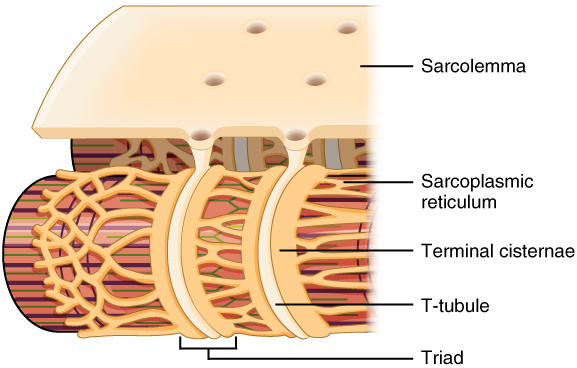
What are T-tubules on skeletal muscle fibers?
the tunnel/layer that is between the terminal cisternae
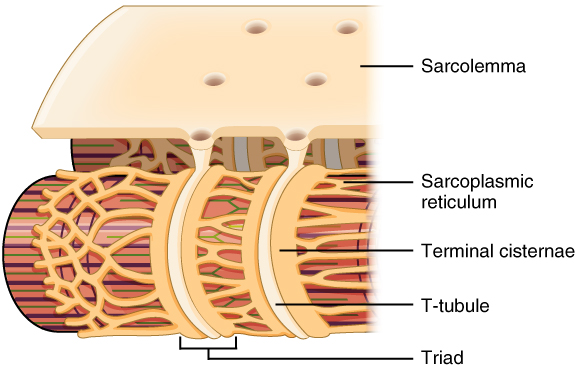
What is the sarcoplastmic reticulum (SR) on a skeletal muscle?
fishnetting around myofibril
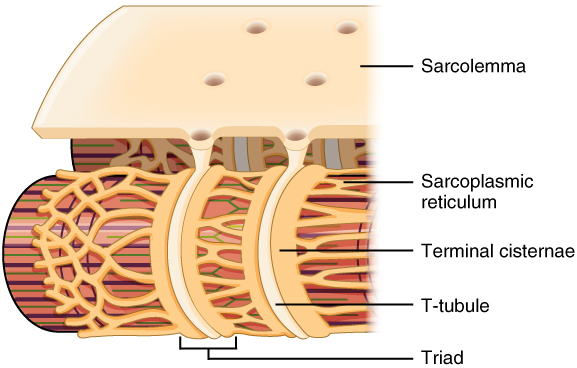
What are terminal cisternae (part of the sarcoplasmic reticulum)?
bookend the T-tubules on the sarcoplasmic reticulum
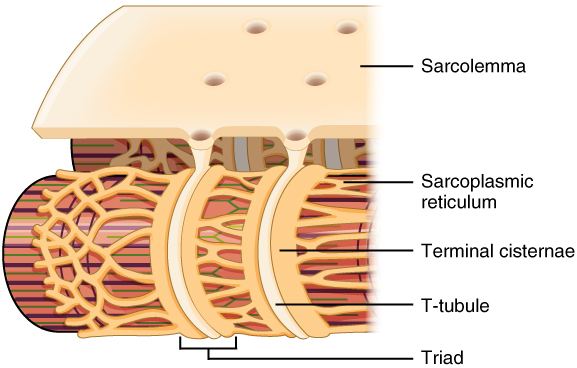
How are muscles organized (smallest to biggest filaments)
myofilaments, myofibrils, muscle fibers/cells (endomysium), fascicles (perimysium), actual muscle (epimysium)
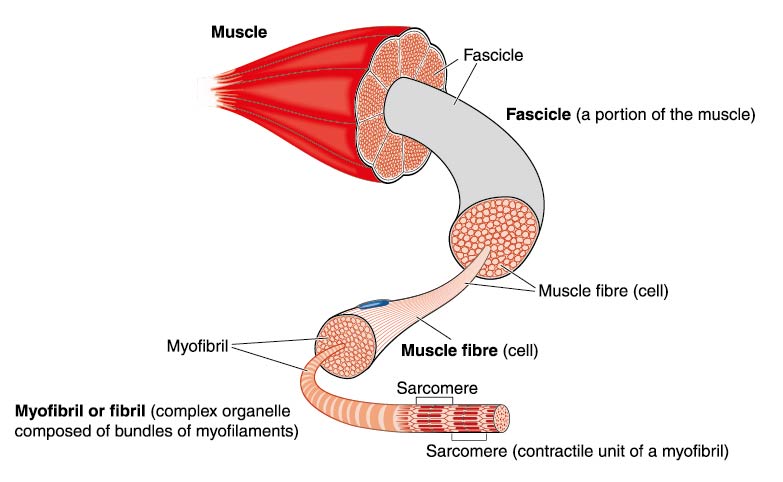
What are myofilments and what are the types?
Myofilaments are the smallest unit of a muscle cell.
thick filaments: myosin
thin filaments: actin
Parts of myosin/think head
motorized head attached to lever arm
fix tail attached to the main portion
Parts of the thin filament
Tropomyosin: one strand that wraps around the strands of actin
Troponin: small proteins that attach to the tropomyosin
Actin: two strands wrapping around each other in a helical pattern
How does the thin filament work?
Troponin is attached to tropomyosin. Calcium binds to the troponin, and the tropomyosin gets pulled away from the myosin binding sites on the actin by the troponin. Wehn the myosin binding sides are available to the myosin heads, the heads attach and, since they have ADP +Pi attached to it, they have energy to move the head along the filament. The Pi and ADP detach which detaches the head from the actin.
What are the components of the sarcomere?
Z line: attaches thin filaments
A band: length of the thick filament (myosin)
I band: has only thin filaments
M(id) line: attaches thick filaments
H zone: only thick filaments
What is muscular dystrophy?
genetic
Duchenne is the most common
Dystrophin is faulty (helps thin filaments attach to sarcomere)
Sarcolemma can tear
no cure (often wheelchair bound)
What happens during rigor mortis to cause the stiffening?
For about 24 hours after death, Ca2+ is still in the cytosol (meaning the muscle is an the contracted position, because the myosin heads attach to the actin) and ATP isn’t available to release the myosin head from the actin. After about 24 hours, enzymes break down the muscle, which releases the myosin head and returns it to a relaxed state.
What is muscle tension?
force generated when the skeletal muscle is stimulated and contracts
What are the phases of muscle contraction?
1.) lag phase: electrical impulse travels down the sarcolemma and t-tubules
2.) Contraction period: tension increases, sarcomere shortens
3.) Relaxation period: muscle relaxes, returns to original length
How does intensity work for muscle contraction?
the body just kinda figures out how many motor units to deploy depending on how big of a force is needed.
max contraction is when ALL motor units are stimulated
What is meant by stimulus frequency?
How often the muscles are signaled to contract. An increase in the frequency of stimulations leads to an increase in muscle tension
wave summation: additive strength of contraction by not letting the previous contraction to relax 100% before the next stimulus is deployed
incomplete tetany: there are faster muscle twitches with higher increased tension than the wave summation frequencies.
tetany: the frequency of the stimuli is so big, that there isn’t any relaxation period
fatigue: follow quickly after tetany because muscles get tired after a while of working. Causes a drop in muscle tension
What are the three pathways of skeletal muscle metabolism?
creatin phosphate
glycolysis (anaerobic)
aerobic phosphorylation
What is the process of creatin phosphate?
This happens during the first 10-15 seconds of muscle contraction. A phosphate is doated to ADP (from creatine phosphate) to get ATP. This energy is used to continue the muscle in the contracted position until glycolysis kicks in. Resting muscle builds up creatine phosphate.
What are the types of skeletal muscle fibers?
Type I fibers: slow oxidative fibers
Type IIa fibers: fast oxidative fibers
Type IIx fibers: fast glycolytic fibers
What is the difference between slow and fast twitch fibers?
slow twitch: endurance runners (Type I)
fast twitch fibers: sprinters, anything that requires muscles to contract quickly (Type IIa and IIx)
What are characteristics of slow oxidative fibers?
less powerful
slower response time
red in color
high fatigue resistance
found in trunk and lower limb
What are characteristics of fast oxidative fibers?
more powerful contraction
faster response time
pink in color
high fatigue resistance
used in moderate activity
found in lower limb
What are characteristics of fast glycolytic fibers?
more powerful contraction
fast reaction time
white in color
lower fatigue resistance
used in short, intense activity
found in upper limb